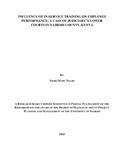| dc.description.abstract | Developing employee’s competences is critical for their performance. To enhance performance,
in-service training plays a critical role in ensuring the employees remains effective, efficient and
competitive. This study aimed at investigating the influence of in-service training on employee
performance in the Judiciary’s lower courts in Nairobi, Kenya. Specifically, the study aimed at
establishing whether Induction training, on-job training, off-job training and career development
training influence employee performance. The study focused on the three courts in the county
namely; Milimani, Kibera and Makadara. The study adopted a descriptive survey design using
both qualitative and quantitative research paradigms. The target population was 203 employees
of the Judiciary comprising of Head of Stations, Magistrates and paralegal staff. The total
population of the magistrates and the head of stations was purposively sampled. The sample for
paralegal staff was arrived at based on 30% representation (Borg & Gall, 2007). Data was
collected using questionnaires and interview guides from a sample population of eighty five (85)
employees. The questionnaire was administered to the magistrates and the paralegal staff while
the interview guide was used to collect data from the head of stations. The split-half method was
used to test reliability of the data collection instruments. The data was analyzed using
quantitative and qualitative approaches with the help of SPSS. The findings were presented
inform of tables comprising of percentages and frequencies as well as in narrative form. The
study found out that most paralegal staff had not attended induction training while all magistrates
had been inducted. 92.3 % of the respondents indicated that induction training has a positive
effect on employee attitude and behavior and a positively affect performance. Hence it was
concluded that Induction training influences employee performance. The study found out that
most employees have undergone on-job training in form of job rotation, coaching and mentoring.
On-job training was found to influence performance by increasing skill levels, productivity and
affects customers satisfaction positively.76.9% of the respondent indicated that on-job training
influences employee performance. It was concluded that on-job training influences performance
in the Judiciary. On off-job training, the study found out that the training transfers knowledge to
actual job, increase interaction of employees, contribute to employee retention, boost morale and
affect customer satisfaction positively. 87.7% indicated that off-job training enhances employee
performance while 61.5% indicated that off-job training increases employee loyalty. Hence it
was concluded that off-job training influences employee performance and increase their loyalty
to the organization. The study found out that 50.8% of the employees have not undertaken
career development training as they are mostly self-sponsored. Career development training led
to enhanced responsibilities for employees and working skills, influence performance and
positively affect customer satisfaction. The study recommended a review of the induction
programme to target all new employees and old employees not inducted upon employment. The
study also recommends a career development programme sponsored by the government
offering courses that lead to upward mobility of employees. | en_US |

